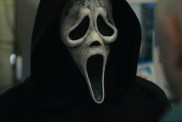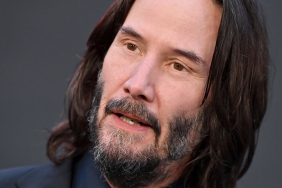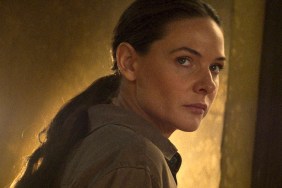They say that one thing you can’t pick in life is your family, something that’s learned the hard way in Australian filmmaker David Michôd’s feature film debut, the crime drama Animal Kingdom.
The story begins when teenaged Joshua “J” Cody (newcomer James Frencheville) sees his mother die of an overdose. He’s picked up by his grandmother Janine (nicknamed “Smurf” and played by Australian veteran Jacki Weaver) and brought to live with her extended family made up of criminals and drug dealers who have been in trouble with the law for most of their lives. They all look to the household’s surrogate patriarch, the eldest brother “Pope” played by Ben Mendelsohn, who is a dangerous sociopath who keeps his brothers in check with fear. When one of the Cody brothers is murdered by the police, the rest of the family seeks revenge beginning a war with the police that has young “J” caught in the middle between doing what’s right and supporting his family.
Having already won a coveted Grand Jury prize at the Sundance Film Festival, it’s an amazing film that moves at a deliberately slow pace in setting up the potentially hostile environment where a teenager needs to learn to fit in to survive. The movie’s big coup is the unbelievable cast, including Weaver, Mendelsohn and newer actors like Luke Ford and Sullivan Stapleton; just the fact that Guy Pearce plays a smaller supporting role gives you some idea of the caliber of the cast Michôd was able to assemble to create this criminally-minded family.
There’s something quite amazing going on down there in Melbourne, that’s already produced the equally terrific crime-thriller The Square, released earlier this year. (Check out our interviews with that film’s director Nash Edgerton and his brother Joel Edgerton, who appears in both movies.)
ComingSoon.net sat down with writer/director David Michôd a few weeks back to talk about his contribution to this amazing wave of Melbourne filmmakers that are putting a new twist on the crime flick.
ComingSoon.net: I’m quite thrilled by what’s going on in Australia right now, because there seems to be this wave of filmmakers coming from down there creating some great films. Are you of the same generation of Nash and all of them?
David Michôd: Yeah, we’re all very good friends and have known each other for quite a number of years and have all made shorts together. It’s been kind of exciting watching (it). You know, when we started, as is the nature of this business is, we generally had no idea what we were doing and it felt like we were kinda making it up as we went along. Started making shorts together and those shorts actually seemed to be doing very well for us. Then for all of us, it kind of evolved into these bigger things. That’s been exciting. The extent to which it does feel like there’s a number of young filmmakers in Australia now who are just really wanting to engage with cinema based on the love and appreciation of those films that they grew up watching–and not just as little kids, but as kind of young adults–just great American cinema from the ’70s, but also, hand in hand with that, kind of a love and appreciation and understanding of genre cinema as well.
CS: As far as this movie, I understand you’ve been developing this for a long time. What was the original idea you wanted to do that made you decide to expand it into a feature film?
Michôd: When I moved to Melbourne from Sydney when I was about 18, I started reading a whole lot of Melbourne True Crime writing, and there is quite a lot of it, a long and rich history of it. One in particular was a story that there’s a book spy guy named Tom Noble. He used to be the chief police reporter at “The Age,” the newspaper in Melbourne. He was there covering specifically what felt like the wild and dangerous period during the ’80s in Melbourne in which there were a number of quite dangerous and hardened gangs of armed robbers, and a serious animosity between these gangs and the police, specifically in the armed robbery squad. At one point in the late ’80s this culminated in a double murder that in many ways mirrors the central event in “Animal Kingdom” which is the murder of two young cops in a cold-blooded random revenge killing. There was something about that particular story, the fact that this wasn’t just two cops dying in the line of duty, this was something really quite unusual and quite harrowing and terrifying. When I was reading about this stuff, it just made the hair stand up on the back of my neck, and there was something so chilling about it that I immediately found myself imagining what those hours and days immediately before and after that event might have been like and just started building what I hoped would one day become a kind of grand Melbourne crime story.

CS: Did you ever think about adapting that story and researching into what happened there?
Michôd: I did. I mean, I think A.) there was something about the freedom about being able to build your own characters from the ground up allows that I was really attracted to. B.) There has been, especially of late, a kind of trend, especially in Australian television, towards the celebration of criminal identities, turning criminal figures into television’s identities and all that. I didn’t really want to be contributing to that in any substantial way. I find it on a basic objective level quite colorful and fascinating, and yet I find it unsettling at the same time.
CS: So the character of J, played by James, could very well have been you at the time you came to Melbourne as you mentioned. What was involved with finding the right young actor to play that role? Did you always want to for an unknown or a lesser-experienced actor?
Michôd: Yeah, I kind of figured that whoever the kid would be, just because he was a kid, would in all likely be at the very least very inexperienced, but I also kind of figured that he’d be a non-actor as well. Because in my experience, those kids, especially young boys, who want to be actors are not the kinds of kids that Jay is, you know? Those kind of weightier and more raw kind of male actors that we’re so familiar with, and especially those ones from Australia, very often decided to be actors a little bit later in life. Most kids who want to be actors, teenage boys especially seem to be of that kind of singing and dancing school. As it happens, James’ background is totally dissimilar to Jay’s and he has done some musical theater and some drama classes at school and stuff, but hadn’t ever done anything before really. He hadn’t been in a film before, but he was just so intuitively talented. It was immediately apparent in the tests he did for us. We had a big, open casting. We saw a lotta kids, maybe 500 kids. His audition pieces were so full of detail that it was quite remarkable for a kid of his age. He was 17 when he did the movie, and tough scenes, too. We tested him with this one scene in particular in the film that’s just him and Guy Pearce talking for what I think is like five pages of dialogue. That’s a tough ask I think for almost any actor, but for James to be able to fill that scene in an audition environment with the amount of detail that he did was really, really impressive and yeah, I don’t think anyone else even came close.
CS: You have all these great Australian actors. Were you thinking of any of them when you were writing the movie and can you talk about figure out who would play whom?
Michôd: There’s a couple. I wrote Jacki Weaver’s character for her; I wrote for Ben Mendelsohn. A little bit later in the process I started writing Joel’s character for him. Jacki, I just knew I wanted. I wanted that character that is from a really hardened world and from quite a brutal world. I wanted that character come packaged in… to have a kind of delightfulness that belied what her inner constitution (was), that her delightfulness in a way was somehow disguising her cold pragmatism. Jacki’s just such a delightful person. She’s so charming and sweet and funny, and yet, she’s been acting for 40 something years, and so is very experienced and very knowing.
CS: I get the impression she doesn’t play characters like this very often, that she plays bubblier woman, so was this something very new for her to do?
Michôd: Yeah, I think so. I think that was one of the things that quite excited her about playing the character. I think on some level she would’ve actually loved to have played the character as a villain. But, we became clear to both of us when we were fooling around with it in rehearsal that it was just, her character was far more compelling when it was sweet.
CS: What about Ben? That’s an amazing character. You said you wrote it with him in mind. Is there something he brought to it that you didn’t expect even when you wrote it for him?
Michôd: Yeah, It think Ben’s (character) is the most complex character in the film and we didn’t find it immediately. It became very apparent to us early on in rehearsal that we weren’t gonna find the character just by getting the scenes up on their feet and running the lines. It was gonna require a couple of dedicated days, him and me in a hotel room together just going through the script line by line, talking about the character and drawing out a map that we can both then draw on.
CS: That was separate from the other actors, right?
Michôd: Yeah, and so, in part also it was because I think there’s frustration for everybody, there would be frustration for Ben, frustration for me, frustration for the other actors if we’re having to do long and laborious detailed work on Ben and his character in a rehearsal time with everybody there. It felt like work that needed to be done privately, and not just because it was very detailed and concentrated, but because of the nature of the character as well, because it was a damaged and confused and emotionally lonely character, it felt like it needed to be found by him and me quietly and privately.

CS: One of the things people have commented about the movie, both negatively and positively, is about the pace. It is a really slow kind of movie. What’s amazing to me is there almost seems to be a fourth act. You think the movie’s over and then there’s another half hour, which is amazing, because it blows everything up. Did the script change a lot once you started shooting or was that pace always very deliberate?
Michôd: I always wanted it to move at that kind of pace. I didn’t want to make a little crime thriller that moved at a punchy pace. I wanted the thing to feel rich and substantial and smart, but also I knew that what I wanted to do was make a kind of grand crime film, but also have a bit of menace running through it that would make it feel really unnerving and almost, at certain times, play a bit possibly like a horror film. My belief is that somehow pandering to the need to cater to people’s limited attention spans, or the need for a kind of pacey, punchy genre film would work against the building of that menace and that sense of tension that I hope is kind of simmering in the thing. But this was also the stuff that Luke Doolan, the editor, and I spent quite a while massaging in the edit and we cut a bunch of stuff out, but I think that’s the kind of normal process. You want to have all the stuff at script stage. I really like Luke’s analogy, that it’s like cooking; you have all of the ingredients and you put them in a pot and then you slowly reduce it down to a finished thing, but you can’t not have all the ingredients to begin with.
CS: You can’t add the onion later and then be like, “Oh, I don’t want to use it after all,” once it’s in the pot.
Michôd: Yeah, yeah. You’ve gotta have an onion to end up with the essence of onion.
CS: Was there a lot more with Craig and Baz in there earlier. I felt like we could know about them and it leaves us wondering by not seeing that much of them, so was there more with them at any time?
Michôd: A little bit. There was a little bit of Baz, but not much. There’s a couple of just little moments. There was a little bit more Craig too, but I think it’s true that every character had a little bit cut out. I mean, some of the big ones had Baz’s wife for instance, there was a number of scenes that didn’t make it in the finished film. I loved the scenes and I think Mirrah Foulkes who plays the character is great in them, but it’s just kind of learning on the job in a way that certain things, that sprawl of characters, as much as I wanted it to sprawl, once you’re on a certain road you don’t have the luxury of veering off that road too often. I think that happened to a few characters. It was about the challenge of balancing that kind of sprawling crime drama with the kind of menacing tension. If you want to maintain that tension you keep it tight. You can’t really sprawl too much.
CS: Were you storyboarding a lot of stuff beforehand? There are filmmakers who do storyboarding for a very specific look and then there’s movies where you have these great actors and you want to give them the freedom to be where they want to be. What was your vision on that?
Michôd: I don’t storyboard. I storyboard some of the more kind of just fiddly things, technical, physical things sometimes, but I don’t like to storyboard, but I do shot list quite meticulously and I like doing it with maps, with floor maps, which I do with my cinematographer and do it in the week before we start shooting, or do it on weekends during the shoot. But once we get onto the set, it’s very specific.
CS: It seems like there’s so many locations in this movie that it would be hard to really figure out how you’re gonna shoot it.
Michôd: Yeah, it is. I mean, just the sheer bulk of the number of shots you need to do, we couldn’t have possibly have done it all in pre-production. We needed to do it during the shoot but some of the locations you don’t even find until three weeks into the shoot. I mean, there’s locations for the back end of the thing, but yeah, I like to keep it a little bit loose. I like to let the actors find their way in the space, but once we’ve found that, I like to keep it very specific. At least in this film anyway, I didn’t want to be throwing the camera around in documentary style or anything. I wanted it to have an austerity.
CS: What’s happened since you finished this movie? I’m sure you have a lot of people interested in having you direct stuff. Do you just want to write another project for yourself or are you looking at scripts?
Michôd: I think so. I’ve been reading scripts. I’ve been reading scripts because I want to stay open. I just want to read ’em anyway, I just think it’s a healthy thing to do, but I’m pretty sure I want to write what I do next as well. I’ve got a couple of ideas bubbling away.
CS: Do you feel like you’ve said everything you wanted to say about crime drama with this movie and want to do something completely different next?
Michôd: I don’t really know. It’d be unlikely that I’d just go and do another crime film. Having said that, totally conceivable that I would do another film in an unsavory world full of unsavory people.
Animal Kingdom opens in New York and L.A. on Friday, August 13. Look for our exclusive interview with Ben Mendelsohn next week.









